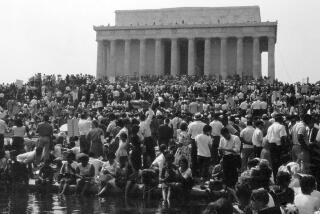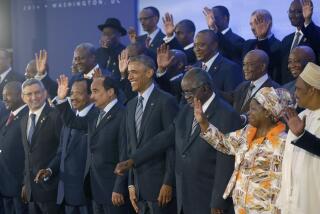Zaire’s Mobutu, Rebel Leader Agree to Meet
- Share via
KINSHASA, Zaire — As rebel troops marched in triumph into Kikwit, the last major city on their path to this capital, President Mobutu Sese Seko and rebel chief Laurent Kabila agreed Tuesday to a face-to-face meeting as early as this weekend.
Kabila said the two agreed to meet, with South African President Nelson Mandela as host, aboard a South African naval ship for discussions that might forestall a violent overthrow of the Zairian regime. There will be just one topic on the table, Kabila said: Mobutu’s departure after 32 years of dictatorial rule.
News of the meeting came shortly after U.S. trouble-shooter Bill Richardson met with Mobutu for 90 minutes at the ruler’s luxurious palace in a military camp near Kinshasa, where he has been cloistered with close family members and loyalist soldiers for the past six weeks.
The aging leader, believed to be dying of prostate cancer, looked stiff, proud and ashen as he posed for a photo with Richardson after the meeting. He wore his trademark leopard-skin hat and a brightly printed, blue silk safari-style jacket. But the edgy mood in the camp around him, where plants grew over rusting artillery and irritable soldiers openly beat a miscreant in view of journalists, augured the end of an epoch in African history.
“The ‘new testament’ has started,” proclaimed Joseph Miense, a Roman Catholic monk in Kinshasa, after talking by radiophone to jubilant fellow clerics in Kikwit just hours after the rebels took over that strategic city.
When the rebels arrived at 6 a.m. to seize control of the provincial center 250 miles east of the capital, people began a daylong celebration, marching and dancing in the streets to mark what for them was the end of Mobutu’s rule, Miense said.
“Happy, happy everywhere,” said a nun whose excitement was evident in her voice even through the crackle of static. “We marched with the population, singing. There is great peace, great peace.”
Despite government claims as recently as last weekend that troops would put up a spirited battle to defend Kikwit, the city fell without a fight one day after its defenders fled, residents reported.
The rebels now control more than two-thirds of Zaire. The loss of Kikwit and its surrounding province, a breadbasket that provides the corn and manioc that feed Kinshasa, represents a huge psychological blow to the Mobutu government.
According to the nun, many of the government soldiers complied with the Kikwit mayor’s request that they lay down their arms even before the rebels arrived, and the remaining soldiers then pulled out quickly Monday. Young men formed vigilante gangs to guard the city from looters Monday night and were on hand in the morning to welcome the rebels with open arms, Miense said.
The fleeing government troops, meanwhile, were regrouping at Kenge, a town 125 miles east of Kinshasa, according to the nun, whom Miense said should not be identified.
Kabila’s soldiers showed up on foot and in four-wheel-drive vehicles, she said, and more were still arriving Tuesday night.
Speaking at his headquarters in Lubumbashi in southeastern Zaire, Kabila said the soldiers will keep going unless the planned talks with Mobutu aboard the South African vessel are satisfactory.
“As far as I am concerned, this will be a short ceremony at which Mr. Mobutu is supposed to agree to leave--otherwise, our forces now advancing on the route to Kinshasa will eject him,” Kabila told Reuters news agency. “I am made to believe he will cooperate with us and avoid a bloody confrontation for Kinshasa.”
Richardson, who is U.S. ambassador to the United Nations, flew to Lubumbashi for talks with Kabila after his conversation with Mobutu in Kinshasa.
“I will be working out other details with Mr. Kabila on free and fair elections [and] the rule of law which should follow after the end of the war,” Richardson said in Lubumbashi, according to news services.
He planned to return to Kinshasa for further talks with Mobutu today after a quick visit to Kisangani, where he planned to observe firsthand the crisis involving Rwandan Hutu refugees, some of whom were reportedly massacred last week by local Zairians and Kabila’s forces and the rest driven into the rain forest.
Of his Tuesday discussions with Mobutu, Richardson said they took place “in a spirit of friendship.” The main thrust of a message that he carried to Mobutu from President Clinton was that the talks with Kabila should take place immediately, aides said.
But they said Richardson also “very bluntly” reiterated the U.S. policy toward Zaire: that the Mobutu era is ending and that the country, the third-largest in Africa, needs democratic transition.
U.S. influence aided Mobutu’s rise to power in the bloody and turbulent first years of Zairian independence in the 1960s, when he took over after the assassination of the country’s first independence leader, Patrice Lumumba.
During three decades, Mobutu was feted by Washington and was considered instrumental in helping the United States oppose Soviet and Cuban efforts to sow communism in Africa during the Cold War.
Richardson put heavy stress on that historical relationship with the United States as he expressed the U.S. view that the time has come for a democratic transition in Zaire, his aides said.
“We were both very frank,” Richardson told reporters. “I carried a strong message, but at the same time I think we made progress.”
In Washington, State Department spokesman Nicholas Burns reiterated the message. “The era of Mobutu is over. The institutions he has built are crumbling, before his eyes and everyone else’s eyes,” Burns said.
South Africa confirmed Tuesday that its ship, the Outeniqua, had reached the Zairian coast for the possible meeting. The Russian-made vessel, used to resupply a research station in Antarctica, offers two luxury suites for the opposing leaders--and a huge icebreaker.
More to Read
Sign up for Essential California
The most important California stories and recommendations in your inbox every morning.
You may occasionally receive promotional content from the Los Angeles Times.












